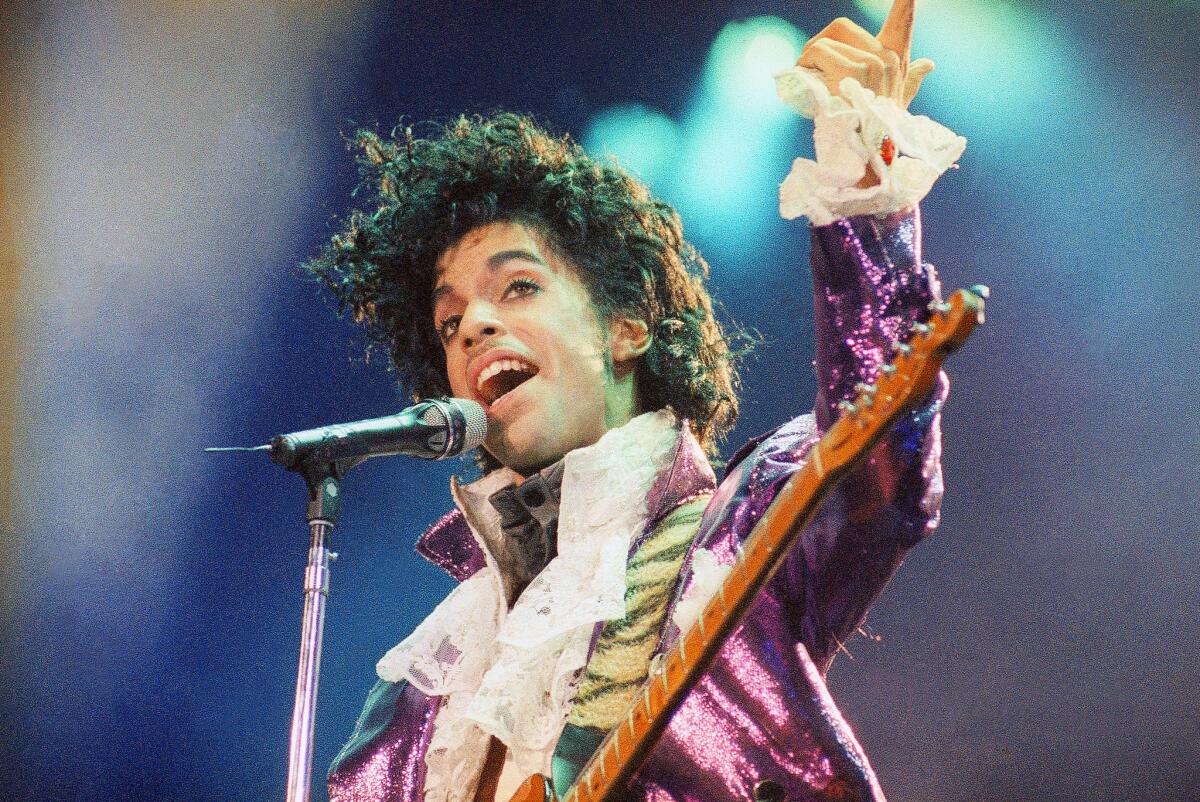10 great moments from Prince’s career

Prince performs at the Forum in Inglewood, Calif., in 1985.
- Share via
The depth of Prince Rogers Nelson’s catalog is astounding, and it would be easy to cite triple the number of songs spotlighted here and deem them “highlights” from a career that spans nearly 40 years since he released his major-label debut album in 1978. But here are 10 standout tracks:
“Little Red Corvette” (1983): His first Top 10 hit, from his breakthrough double album “1999,” drew on the blues-R&B tradition of playful metaphor and allusion to celebrate a sexual encounter. The saucy lyrics were framed in music that began subtly and crescendoed patiently to a gloriously festive chorus.
“Delirious” (1983): The follow-up to “Little Red Corvette” was even more lyrically provocative and musically explosive in toasting the act of sexual abandon: “Girl you gotta take control cause I just can’t steer,” set to an impossible-to-resist rock-soul melody and incessantly bouncy rhythm accompaniment.
“When Doves Cry” (1984): Prince’s early albums included other odes to love that were disarmingly vulnerable, but this one from the “Purple Rain” album gave him his first No. 1 hit, one that held the top of the chart for five weeks. It channeled the anticipation, the risk, the chemistry of two people in love as he set a romantic scene in words with poetic economy and beauty: “Dream if you can a courtyard/An ocean of violets in bloom/Animals strike curious poses/They feel the heat/The heat between me and you.”
“Purple Rain” (1984): While the “1999” album put Prince into the Top 10 of the national album chart for the first time, “Purple Rain” threw the doors of mainstream acceptance wide open. It logged an astonishing 24 weeks at No. 1— nearly half the year, thanks in equal part to the staggering quality of hit songs and to the success of the accompanying quasi-autobiographical hit movie. Prince’s vocal, building from a quietly apologetic opening, “I never meant to cause you any sorrow,” through cries of anguish at the exalted chorus, remains one of the signature numbers in his extensive repertoire.
“Raspberry Beret” (1985): Turning his ever-restless attention to the psychedelic revival that was sprouting in various corners of the pop world in the early ‘80s, Prince zoomed again up the pop charts with this swirling and seductive song about a woman who’s captured his imagination with her sartorial style: “She wore a raspberry beret/The kind U find in a second-hand store/Raspberry beret/And if it was warm she wouldn’t wear much more.”
“Kiss” (1986): Prince shifted away from the often massive production of his recordings of the early 1980s to a stripped-down sound built on his stratospheric falsetto, soaring over sparse rhythm guitar licks and the always sultry pulse his rhythm section brought to bear. The song helped 1960s-1970s sex symbol Tom Jones rekindle his career for a new generation with his 1988 recording on which he was backed by the English synth-pop band Art of Noise.
“Cream” (1991): His last No. 1 hit during his lifetime logged two weeks atop Billboard’s Hot 100 singles chart. It was yet another sexy R&B romp full of racy double-entendres referencing music, such as “Look up in the air, it’s your guitar…U got the horn so why don’t you blow it.”
“Nothing Compares 2 U” (1993). Prince wrote this searing love song for his side project, the Family, which included it on its one and only album, released in 1985. It wasn’t released as a single, but it did catch the attention of Irish singer-songwriter Sinead O’Connor, who released her recording in 1990 — said to be directed as a tribute to her late mother, and its lyrics about a lover who left a relationship adapted beautifully to the loss of a family member: “It’s been so lonely without you here/Like a bird without a song/Nothing can stop these lonely tears from falling/Tell me where did I go wrong.” O’Connor’s version became a No. 1 hit in at least a dozen countries, and it dominated Billboard’s U.S. singles chart for a month. Prince’s own version subsequently surfaced on a 1993 hits and B-sides compilation album, and he periodically included it in his concerts.
“The Most Beautiful Girl in the World” (1994). Abandoning the sexual innuendo that marked so many of his songs, Prince earned his way back into the Top 10 with this straight-ahead love song, which reached No. 3 in Billboard. Sacrificing artifice or calculation of any sort, he expressed a wish for a love that would last forever: “When the day turns into the last day of all time/I can say I hope U are in these arms of mine/And when the night falls before that day I will cry/I will cry tears of joy cuz after U all one can do is die.”
“Mutiny” (2014): Three decades into an extraordinary and often mystifying career, Prince caused a sensation yet again when he appeared with his explosive New Power Generation band on the revived “Arsenio Hall Show” and performed this song. He and his cohorts miraculously found the meeting ground between forward-looking big-band jazz, an old-school R&B revue and contemporary dance club workout. As always, Prince proudly relied, as he often put it, “on live music played by real musicians.”
Follow @RandyLewis2 on Twitter. For more on Classic Rock, join us on Facebook.
MORE:
Where music meets religion: What an L.A. Times writer learned spending a night with Prince in 2009
Prince: ‘If I knew the things I know now before, I wouldn’t be in the music industry’
Stars react to Prince’s death: ‘A world less funky. I don’t want to believe it’
Playlist: Prince’s recent songs
Remembering Prince: The time he crushed the Super Bowl halftime show [Video]
More to Read
The biggest entertainment stories
Get our big stories about Hollywood, film, television, music, arts, culture and more right in your inbox as soon as they publish.
You may occasionally receive promotional content from the Los Angeles Times.









